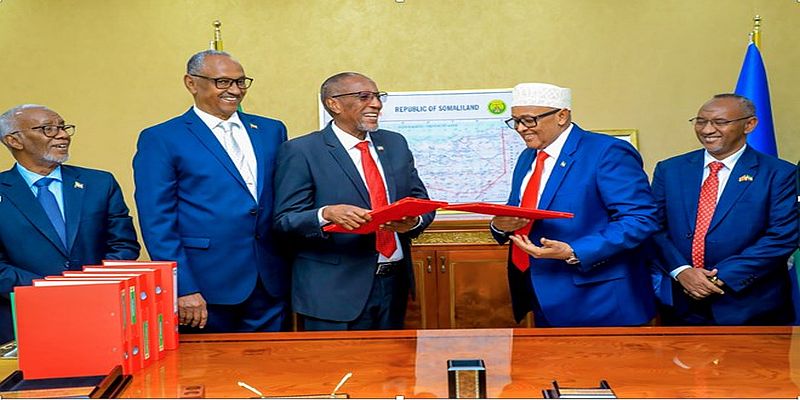World's View of Somaliland’s Election and Transition

Last month, Somaliland held its 4th peaceful democratic multi-party election since they declared their independence for the second time in 1991. First, they got their independence from Britain in June 1960, and then, for the second time, they unilaterally declared their independence from Somalia in 1991, after their ill-fated union with Somalia in 1960 had failed. This failure resulted in extrajudicial killings of thousands of civilians and the indiscriminate bombing and destruction of its cities by the dictator Siyad Barre’s army and their South African mercenary pilots, hired after most of the pilots in the air force refused to bomb the civilian population, including hero Ahmed Dhere, who dumped and parachuted from his fighter plane, sent to kill and maim civilian populations, off the coast of Djibouti.
British anthropologist I.M. Lewis, who wrote extensively about Somali people and their culture, is one of the leading academics who shaped the outside world’s understanding of Somali society, culture, and history. In his research and study, he stated that Somali society is best understood through the lens of a segmentary clan system, in which corporate groups conflict, leading to endemic violence and with loyalty to their clan taking precedence over all else. According to his study, this ultimately explains the root causes of the civil war and the subsequent disintegration of the Somali central state in 1991. However, Somaliland has proven again to the world that this is no longer the case, and it is a beacon of democracy and order in a turbulent region where lawlessness and anarchy are the norm.
Even though Somaliland is still unrecognized, it has established a democratic track record that only a few countries in Africa can match. All its 4 multiparty elections in the last 2 decades have been described as free and fair by international observers. In this election, the electoral process comprised a considerable logistical and financial effort. In a country of about 5 million people, 1,227,048 were registered to vote across 2,648 polling stations countrywide. It was also reported to have been the first election in which an iris biometric system was deployed, capable of offline checking at 1,068 polling stations. In addition to the international observers, over 13,000 polling officials were recruited, and thousands of security officers were deployed to ensure the safety and security of the voters. Furthermore, the electoral commission partnered with both mainstream and social media in the country for the purpose of accurate reporting and voter guidance and education.
A few days after the election, Somaliland’s National Electoral Commission (NEC) officially declared the result. Waddani, the largest opposition party led by Abdulrahman Mohamed Abdilahi (Irro), secured a clear victory with 63.92% of the vote, while the incumbent president of the Kulmiye Party, Muse Bihi Abdi, came second with 34.08% of the vote. Immediately, President Muse Bihi magnanimously conceded defeat, calling for national unity and expressing his willingness to ensure a smooth transfer of power and presidency to the newly elected president, Mr. Abdurahman M. Abdilahi (Irro).
Good Governance Africa (gga.org) In its analyis of the election said that the successful conclusion of the electoral process helps to further solidify Somaliland’s democratic credentials, which it has been showcasing to the world in the last 2 decades. And it would further entrench the democratic means of resolving political differences and project itself to the region and beyond as a beacon of peace, stability, and democratic governance in a turbulent region where elections are mired by violence and irregularities, as is currently the case in Mozambique elections.
ARAB NEWS (www.arabnews.com) stated the fact that Somaliland has consistently demonstrated a more democratic and stable profile than its neighbors. It adds this compelling narrative of stability juxtaposed against regional chaos forms the bedrock on which Somaliland stakes its claim to statehood.
Crisis Group (www.crisisgroup.org) stated that Somaliland reinforced its reputation as one of the Horn of Africa’s stronger democracies by staging a successful presidential election and ushering in a peaceful transfer of power.
THE INDEPENDENT (independent.co.uk) stated that Somaliland’s recent free and fair election, which the opposition leader, Mr. Abdurahman M. Abdilahi, won, would herald the recognition of Somaliland as an independent state by the new US administration led by President Trump, which will take office in the new year.
SOUTH CHINA MORNING POST In its analysis stated that China’s special envoy for the Horn of Africa, Xue Bing, was dispatched to Somalia to assure them of Beijing’s support, amid growing support in Washington for the recognition of Somaliland, following their successful election and subsequent smooth transition of power. It adds that the swearing-in ceremony for the president-elect, Abdurahman M. Abdilahi, was attended by Taiwan’s deputy foreign minister, Wu Chih-Chung, leading to a protest by China.
SEMAFOR.COM This US-based news outlet stated that the US Republicans and its supporters have been encouraged by Somaliland’s democratic strides with its one-person, one-vote system, as conflict-ridden Somalia struggles to organize any elections. It adds that Somaliland will be much closer to being recognized by the United States as the world’s newest country when Donald Trump returns to the White House in January 2025.
The US congratulated the people of Somaliland on the completion of their election. The US congratulated President-elect, Mr. Abdurahman M. Abdilahi. In a statement, the U.S. Embassy in Somalia praised Somaliland’s impressive record of elections and peaceful transfer of power, describing it as a model for stability and democratic governance not just within the Horn of Africa, but beyond.
"Government of the people, by the people, for the people." In sha Allah.
By Abdurahman Ibrahim Yusuf
Courtesy: Hiraan
